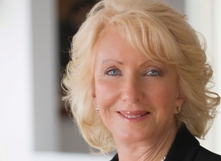In Immigrant Faces, Holocaust Survivor Sees Her Own Family’s Past
Date: August 22, 2017
Diane Portnoy was 3 when she passed through Ellis Island with her parents — Polish refugees who lost their families in the Holocaust. Now she runs The Immigrant Learning Center, a free language and skills training center in Malden, Massachusetts, for immigrants and refugees. Portnoy has taught English to 9,500 new arrivals, helping them secure jobs, start businesses, enter training programs, become citizens, and achieve their goals in the United States. “I walk through the classes and I see my mother and my father,” she says. “The skin color and the country they came from may be different, but inside we’re all the same.”

Portnoy’s parents married in 1938, one year before German forces invaded Poland and occupied their hometown of Kalish. Her father, a ping-pong champion and local celebrity, was immediately taken hostage, but he later escaped with the help of his Polish guard, returned to his wife, packed a bag, and fled that night. “That was the last time they saw any of their family,” Portnoy says. “Their entire families were killed — parents, siblings, aunts, uncles, everyone.” Her parents spent the war in hiding, and ended up in Stolp, in eastern Germany, where Portnoy was born in 1946.
When Portnoy was a few months old, her father paid a truck driver to smuggle the family into the American sector of West Berlin. In 1949, one year after the U.S. Displaced Persons Act began admitting hundreds of thousands of European war refugees, the family crossed the Atlantic on a converted battleship, filed through Ellis Island, and was sent to live in a community of Yiddish-speaking immigrants in Malden.
Portnoy’s parents learned English by listening to the radio and conversing with colleagues in the textile factories where they found work. They sent their daughter — already fluent in Polish, Russian, Yiddish, and German — to an English-language preschool. Portnoy thrived, and went on to receive a bachelor’s degree from Boston University and a master’s degree in curriculum and instruction from Cornell University.
In 1992, using funds she scraped together from family and friends, Portnoy launched The Immigrant Learning Center. It started small: Three classrooms, with space for 60 students, in donated office space. Today it fills a building and trains more than 900 students annually in English, entrepreneurship, and other skills. It’s work that ultimately helps everyone. One study found that an estimated 1.9 million high-skilled immigrants are underemployed, leading to an annual loss of $39.4 billion in earnings and $10.2 billion in tax payments. A lack of English skills is the largest contributor to such underemployment.
It’s nuts to have all these people contributing so much, and creating jobs and starting businesses, and yet they can’t stay here.
“Most of our students find jobs, or go into skills programs or go to college,” Portnoy says. They return to share their success stories with the woman who helped them. “They’ve started a business, or they’re an accountant, or a dentist, or they’ve opened a garage,” Portnoy says.
It’s a path many immigrants take. There are 68,699 foreign-born entrepreneurs in Massachusetts alone, running businesses that combined employ 134,477 Americans. That’s hardly surprising given immigrants‘ energy and perseverance, Portnoy says. Some Americans harbor the misconception that if the country had open borders, people would flood in, she says. But the reality is that it takes a very special kind of person to leave their home and start over in a new country. “These people have a certain drive, a certain ambition. That’s always been a part of America. It’s what makes us special.”
That’s why she supports immigration reform, so people who want to give their best talents and skills to the American economy can do so. Portnoy often sees immigrants — from low-skilled workers to students and entrepreneurs — who have plenty to offer but who ultimately have to leave the United States because of visa restrictions. “It’s nuts to have all these people contributing so much, and creating jobs and starting businesses, and yet they can’t stay here,” she says. “It makes no sense. We shouldn’t be making it so difficult.”
